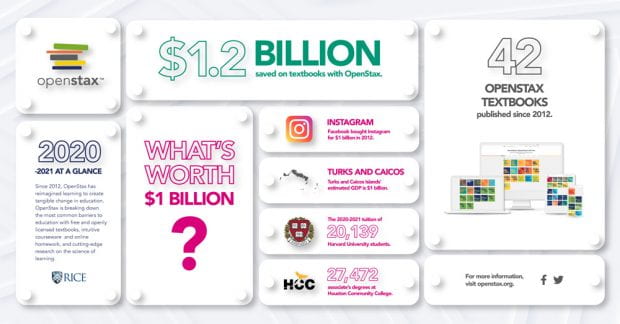Jeff Falk
713-348-6775
jfalk@rice.edu
OpenStax surpasses $1 billion in textbook savings, with wide-ranging impact on teaching, learning and student success
HOUSTON – (Aug. 31, 2020) – Less than a decade after publishing its first free, openly licensed textbook, OpenStax — Rice University’s educational technology initiative — has saved students $1.2 billion.
Driven by the belief that everyone should have access to knowledge, OpenStax has published 42 titles for college and high school courses across science, math, social sciences, business and the humanities disciplines since 2012. It has served over 14 million students with its resources, with more than 36,000 instructors from across the world adopting an OpenStax textbook. Every book in its library is available free — forever — to students and independent learners.
When OpenStax first entered the textbook market, instructors did not widely use open educational resources as core course materials. At that time, traditional textbook publishers controlled nearly the entire course materials market. A single new textbook could cost upwards of $300, and a growing number of students were foregoing their required course materials because they were so expensive.
“When we first launched OpenStax in 2012, there was a lot of excitement but also a lot of skepticism,” said Richard Baraniuk, the Victor E. Cameron Professor of Electrical and Computer Engineering at Rice and the founder and director of OpenStax. “Many wondered if we could meet the quality standard that faculty were looking for. Now, we’re trusted by tens of thousands of educators. We’ve supported millions of students. And we’ve saved those students more than $1 billion that they have reinvested in their education, their communities, their families and more.”
OpenStax has contributed to the widespread popularity of open educational resources by publishing comprehensive, peer-reviewed textbooks that are openly licensed, allowing for adaptation to fit the context of any classroom. The positive disruption in the textbook market that has led book prices to decline has been attributed to OpenStax’s work.
“We’re witnessing a moment in the education community where growing numbers of students, educators and administrators expect more from their educational materials,” said Daniel Williamson, managing director of OpenStax. “We are not alone in our understanding that free is the only price point that works to level the playing field for every student, and that flexibility affords learners and educators the academic freedom necessary to innovate in the classroom.”
Now used in 60% of degree-granting institutions in the United States, OpenStax textbooks have had a positive impact on the lives of countless college and high school students.
“Having free and unlimited access to the textbook assigned for my general chemistry sequence saved me hundreds of dollars, and I can continue to brush up on the topics in the years to come because I didn’t have to return the book,” said Veronica Mucciarone, a student at Northern Virginia Community College, in a survey conducted by OpenStax on student experiences with its resources during the COVID-19 pandemic. “I am so incredibly grateful for this site.”
“I was trying to go beyond the classroom,” said Drew Carter, a student at Cal Poly Pomona, of his experience using OpenStax to supplement his assigned course materials. “Using the OpenStax textbook alongside the resources I was being given in class really helped me comprehend the information. What excites me is not only what OpenStax has already done, but what the open community can do in the very near future.”
OpenStax also supports independent learners like Connie Taylor, who is interested in going back to school to pursue a master’s degree in statistics. She hasn’t taken a math course in two decades and recently decided to brush up on her skills. With limited resources at her local library, she was able to rely on OpenStax to review and practice algebra and trigonometry.
When high school biology teacher Linda Bray was hired for the spring 2020 semester, she couldn’t have guessed what she would be up against. The pandemic interrupted her life, the lives of her students and her teaching plans midway through the semester. “If it had not been for OpenStax and the teacher resources that were available, I do not know what I would have done,” she said.
About OpenStax
OpenStax is committed to improving access to quality learning materials. As an ed tech initiative that is part of Rice University and supported by philanthropic foundations, OpenStax provides free college and Advanced Placement textbooks that are developed and peer-reviewed by educators, as well as low-cost, personalized courseware that helps students learn. For more information, visit http://OpenStax.org.
-30-


